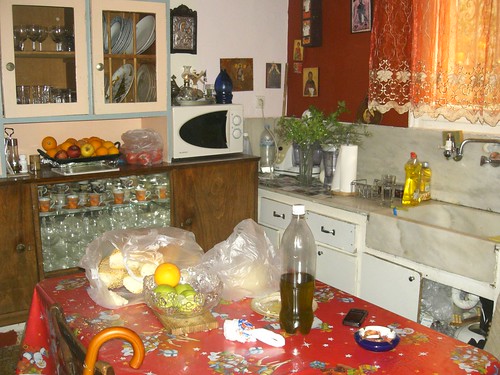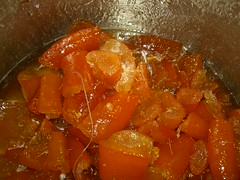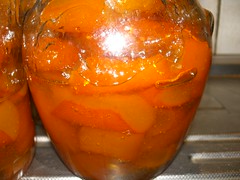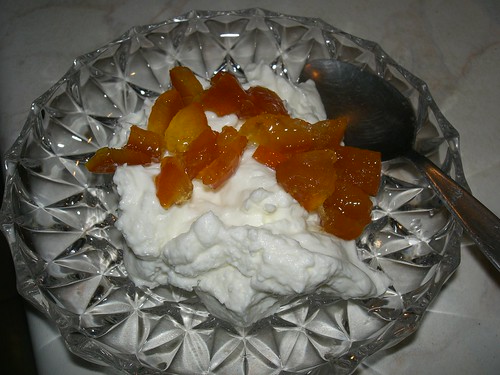"I don't think I'll be going back home this year. My husband doesn't want to, he's been offered a lot of jobs from landowners in the fields. I hate taking those long journeys on my own. I'll never forget the last time I travelled without him; the children were very young, I was trying to juggle their hands with holding the suitcases, and my Greek language skills weren't so good at the time, so I couldn't read the signs and understand the officials' directions as quickly as I needed to; I almost missed my connecting buses. It was a frightening experience. It's also a very long trip; it takes two days to travel from Crete to the village I call home...
"Once I get there, though, I forget that I ever left my home country. I catch up with my parents and siblings, and the children get a chance to discover their parents' homeland and compatriots. They meet up with their aunts and uncles and cousins from their father's side and speak in Albanian. I sometimes think that they don't know how to speak their mother tongue - they always speak Greek to one another here in Crete, as well as to all their cousins from my side of the family. I have seven brothers and sisters, and they all live here in Crete with their families, except one who lives in Trikala. But as soon as we go back home, they start yapping away in Albanian, and it makes me so proud to know that they can speak our language, that they can learn about their roots and will be able to come back home every now and then, even though times aren't too good for us to move back now. I bought some books for them to learn to start reading in Albanian, so now they speak both Albanian and Greek fluently, and they're starting to learn English at school, too...
"Even though I want to go back home, I still feel like a stranger in my country. Every now and then, people say things to us that remind me of that. People look at us in a different way, as though we're made of money and we can afford anything in the world. That's not true; we can afford to live well in Albania, but the money just gets spent there; last time we visited, we went through 3,000 euro, and we were off work for over a month! We're only just able to afford our expenses here in Greece on the wages we earn, especially since we also try to put a little money aside. If we couldn't do that, then we may as well stay at home rather than leave, to live just like we do now. My friends and family back home don't know how hard we've worked to be able to afford this life, how much we try to save, how much we do without. They call us Americans, even though we've never been to America! We've never even been to a taverna here in Crete. Our only outings are to the sea. When we go to the beach, we take a packed lunch with us, we don't buy toasts and drinks from the beach canteen like everyone else does. Our clothes are from street markets, other times from the Chinese shops. The boutiques are so expensive! Who can afford to buy clothes from there? They'd have to be millionaires! If we did that, we'd never save any money, we'd never be able to better our lives. We didn't come here to spend, we came here to work and save...
My friend's kitchen; bits and pieces of miscellaneous furniture tossed away by Greeks (usually left by bins) are given a new lease of life by economic migrants.
"Work is a good thing. It doesn't matter if it involves cleaning or cooking or factory work. I don't have anywhere to leave my children when I work, but I've instilled it into them that they should not leave the house while I'm gone, they should keep quiet and watch television or read books, or listen to music. I'd be so ashamed if they disturbed the neighbours in any way while I'm out. And I know they do just what I tell them, because if I found out that they were up to something else, I'd find a job for them to do, and then they wouldn't have any free time at all. I can't understand why some of the local women don't work, though. They have their mothers and grandmothers and sisters all living close by to each other, who can look after their children and share the cooking among them, and they still don't work. I don't want to sound offensive, but what's up with those people? How do they make ends meet in times like these? And how can they afford to eat out all the time, and order delivery food regularly? I just can't understand it...
"I don't waste anything. Not a single thing. If it can be eaten, we eat it fresh, we eat it cooked, we preserve it, we freeze it. A lot of people waste food, then they complain about the cost of living. The other day, my husband bought some nerantzia* home that he had been given by the landowner where we keep a garden. Just imagine, the man has nerantzies** in his orchard, and he told us he doesn't use the fruit himself, and nor does his family! I work in a packing house. Nerantzi and grapefruit aren't popular packing house fruit, so I took them home myself. I squeezed the juice out of the grapefruit and mixed it with orange juice. We drank as much as we could handle. Then I made spoon sweets out of all the grapefruit and nerantzia peel. I gave some to the landowner and he told me he hadn't had the grapefruit kind of spoon sweet before. I offered to teach his wife how to make it...
Making traditional spoon sweets involves few ingredients, but quite a lot of time. The fruit used is often underripe (figs, aubergines) and/or bitter (citrus peel), which necessitates placing the fruit in water which is changed on a regular basis to remove the fruit's bitterness. But the final result is always worth it - cholesterol-free, refreshing sweets, that can be enjoyed alone with a glass of water before a meal, or as a topping for yoghurt or ice-cream, making the perfect dessert. I used 20 small bitter (Seville) oranges to make this sweet, using the recipe pictured here.
"Before we moved into this house, we were living in very cramped quarters in another area. It didn't feel right, but I didn't like living altogether in the one room. Then there were all the other people in the other rooms. There was never any peace and quiet, everyone knew what each other was doing. Some people still live like that, but I think they should know better. We did that for a little while, but we couldn't carry on living like that forever. When I first moved into this house, everyone kept telling me that I didn't need an extra room, and I could lower my rent costs by letting out the extra room, to another migrant like ourselves. I'm surprised that people don't value their privacy as much as I do. When they visit us, they are surprised at how large the rooms are. Some of our acquaintances are still living packed like sardines in very old village houses, sometimes a family of four or five people in each room. I don't see why I should live like that at all...
"We were thinking of buying some new furniture to fill the empty spaces in this rented property, but we really don't know how long we will be here for. We recently bought a new car; we know we can take that back with us. In any case, the next time we go back home again for a visit, we'll go by car instead. If ever we want to move back home, we can use it to transport some of our things. But we can't pile beds and armchairs and tables into it, can we? So we're just making do with some cheap second-hand furniture that some friends were getting rid of, because they had decided to move back home. But they came back again after only two months; the house that they had built in their village was demolished by the authorities without informing anyone first. They were simply told it was illegal. I feel sorry for them, because they had invested 35,000 euro in that house, money that they were scrimping and saving from their jobs in here, and now they have to start all over again...
"I'd like to move back home one day. I love our village, we're building a house there. Every year, we build something new in it with the money we've saved here. But we can't move back now. Not now, and not for a long time yet, judging by the way the economy is going here and there. There are no jobs, and few prospects for anyone who still lives there. Still, it's better than what it once was. You couldn't leave the house in the darker days. There were children as young as nine patrolling the streets with guns. That's over now. But life is still hard there. People are very poor. They work on their land, gathering food and storing it for the winter. Each household has a couple of cows, one of which is kept for milking while the other is slaughtered for meat. It's a question of basic survival; there is very little available for them to do there apart from that. If I were to return and stay for good, what would I do there? Here at least, my children are at school, and they're good students. We moved to this house so that they could be nearer to the English school too. They may even go on to university, and there are always jobs available here for them. We're happy here, and people treat us kindly. We want to go back home one day, but the time has to be right before we do that. There is hope for this to happen one day. And hope always dies last."
* bitter (Seville) oranges
** bitter (Seville) orange trees
The woman was surprised to discover that I was 'not from here':
"Oh, so you're not from here!... And you're working?... Where is that?... Albanians?... I don't know, I haven't met any who work there... They're students?... What are they studying?... I didn't realise that there were so many of them... I wonder where they come from, possibly Tirana or Korca, I doubt they're from the villages... So what do you do there?... You're teaching?... You're a teacher!... You could go to any country in the world and teach English, couldn't you?... So why are you still here?...
*** *** ***
This conversation could have taken place between my parents and their New Zealand neighbours, if the appropriate place names are replaced. I remember many discussions of exactly the same kind as I was growing up in NZ. But it wasn't my parents talking. It was the wife of the Albanian man who we employ to pick our annual crop of olives (Albanian people are known to be hard workers - and good savers, according to the Greek banking system - and the locals appreciate their work ethic.)
The kind of lifestyle the Albanian immigrants are living now in Crete in 2009 and the life my parents lived in the mid-1960s in New Zealand are incredibly similar. Even though Albania neighbours Greece, few take flights back home, preferring the cheaper 2-day bus journey, overnighting on the ferry boat, coaching to Ioannina, changing buses there for Albania, and finally taking another bus to their own village (they've seen more of Greece than I have). Their journey lasts just as long as it takes me to get back to New Zealand from Crete!
Generally speaking, the unskilled immigrants do not come from large towns; urban and rural citizens of undeveloped countries do not have much to do with each other, and there is an intense feeling of class differences among them (similar to how rural people were viewed up to the 1980s in Greece - before joining the EU - by their urban compatriots). Working, saving, never wasting, living frugally, eating in, raising their children according to the strict old ways, educating them, and planning on returning home are all part of the unskilled, uneducated, working-class immigrant's dream, no matter where they come from.
And no matter what is happening around them, they continue to live an isolated existence away from mainstream society and worry about how fast their children will assimilate into the new world, and how quickly they will forget their old world, which is why the mother tongue is of primary concern to them: it is very often the only link they have to the 'other' country, since, in many cases, Greek (and Albanian) immigrants blend into mainstream society wherever they migrate, as their skin colour and dress code do not differentiate them much from the locals.
And just like my parents did all their lives in New Zealand, the economic migrants of Greece constantly dream of going back 'home' one day.
©All Rights Reserved/Organically cooked. No part of this blog may be reproduced and/or copied by any means without prior consent from Maria Verivaki.




You capture the EXACT picture of what is happening. I felt the same way... but I lack your eloquence!
ReplyDeleteI thought this entry was very beautiful. Maria, you are growing as a writer. I felt like I was right there, and my heart really aches for how hard they work, for the love this woman has for her family and her home.
ReplyDeleteWhen my parents emmigrated to Canada from England they had always planned to live here only 5 years and then go back "home". Four kids later they finally went back to visit when I was 10.They came here with nothing, like everyone, and built a very good life for themselves and their kids. This is a story that could fit well in every country of the world.
ReplyDeleteI find it very strange that the civil "servants" are taking time off to bitch about reforms and the hard working migrants are carrying on getting on with their lives! Let that be an example to the Communinist trouble makers.
ReplyDeleteRant over!